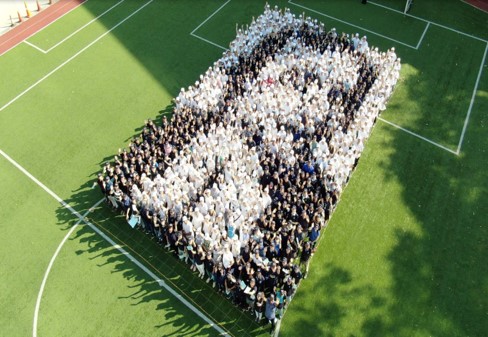By Seminarian Eugene Chan, former teacher in a non-Catholic mission school.
And Jesus came and said to them, “all authority in heaven and on earth has been given to Me. Go therefore and make disciples of all nations, baptizing them in the name of the Father, the Son and of the holy Spirit, teaching them to observe all that I have commanded you; and behold, I am with you always to the close of the age.” [Matthew 28:18-20]
If you have ever caught the “Our Catholic Light” video, one can learn of the history of how Catholic Mission Schools first arrived in Singapore. Brother Nicolas Seet (FSC) shared how Father Jean-Marie Beurel (MEP), realising the need, went back to Europe and came back with six Lasallian brothers and four Infant Jesus sisters to setup the first Catholic Mission Schools in Singapore. This was a three-month journey by boat and during the trip, one of the sisters passed away just two weeks before they could arrive in Singapore. In 1852, St Joseph’s Institution was founded and two years later, in 1854, the first Convent of the Holy Infant Jesus began. For Father Beurel, these schools were especially for the poor for he saw the value of education and thus education was provided for free for children of any background.
A century and a half later, we acknowledge their sacrifices and rejoice at the fruits of the many Catholic schools with their rich traditions. What is more, we can empathise with some of the hardships that they faced as we all live through a pandemic that perhaps has changed so much of how we live. It might be timely thus to look back and examine just what brought us to our current school of choice.
For students, some might have chosen to come to your current school. For others, perhaps the school that you are in was the alma mater of your parent. For others still, perhaps this school was simply the closest within a one or two kilometre circumference of where you stay. Regardless of the reason, now that you are in a Catholic mission school, have you ever wondered just what difference does it make? What elements of your school’s tradition have you drawn closer to? What virtues or values has your school challenged you to grow in? Compassion? Humility? Integrity? Perseverance? Faith? Care? Honesty? Service? What difference has your time in your school made for you?

For as much as our world is changing, somethings will always keep us in good stead. The values and principles that your school champions, these will be the keys that will help you reach for the higher things in life. For what does it matter how many more zeros you can add to your bank account, if all you spend them on is yourself? What good would it do for you if all your achievements only resulted in you becoming universally despised, with not a single person you have ever worked with willing to ever work with you again? Would there be any lasting satisfaction for achievements gained through wicked means?
Reach higher, aspire for the things that last! Your founders built your school on their relationship with Christ, may you too discover just what adventures a relationship with Him may bring you to.
For teachers, perhaps this is your first posting or maybe you have become an institution or a “legend” in your time with your current school. Perhaps you are intending to apply at the next open posting or even at the next closed posting phase. Still, it is not easy being a teacher. It is probably even harder to be a good teacher in this day and age, whereby almost every word and action that you do and say are taken to task. And yet, this is the vocation which you have responded to. One that requires countless hours almost every day of the week. (Usually thankless, sleepless and without re-imbursement.) Not to mention having to navigate the twists and turns of your own struggles. Truly, few other jobs ask for this much and at such cost. Thank you, teachers.
As St Jean-Baptiste de La Salle would put it “the ministry of teaching is about helping the young cross the threshold, from ignorance into enlightenment”. In this Information Age, the Internet and technology have changed just what it means to be ignorant. To find out about the life of St de La Salle, one need not pour through a 200 page tome, but simply watch a one hour video. Yet, what then are they to do with that information? How will they make use of it? To paraphrase the Venerable Fulton Sheen, we need to ensure that the next generation knows more than just the “price of everything but the value of nothing”. How can we empower the next generation to resist the traps of social media, of cyber-bullying or of gaming addiction?

This ministry can only happen with a continuity of teachers. For to combat the evil of ignorance, teachers cannot just instruct but role model. The values of respect, responsibility and resilience are not just words and videos that are used for our class contact time but real mindset changes and actions that we need to live out. Our students know the difference. The de La Salle brothers would thus show the students how to pray, not just give them the prayers, explain the Mass, not just bring them to Mass. Religious instruction was simply to know and to love God and one’s neighbour and as we definitely familiar with; your life maybe the only Gospel that someone might ever read.
We cannot give what we do not have. If we are to give the gift of faith, we need to have a relationship with the One Whom it comes from. If we do not know how to pray, how then can we expect our students to stay silent when it is time for school prayers? Let us progress along the two rails of faith and reason as a mission school community, faithful to the vision and mission of our religious founders.
Ad Dei Gloriam.




 We cannot teach them as if they are just dry subjects; they are not. [This is] why a Catholic school does not mean that we have all these academic subjects, and—over and above all these—we have another optional subject called “Religious Knowledge”. Rather, if a teacher is imbued with the Gospel, and is convinced that what he is teaching has great importance in the lives of our students and of future generations, he would, in a very subtle or unconscious way, inject the values of the Gospel, his convictions, her convictions, into what she is teaching. That is what it means to be a Catholic school: Catholic in the way we look at life, [Catholic] in the values that we are offering.
We cannot teach them as if they are just dry subjects; they are not. [This is] why a Catholic school does not mean that we have all these academic subjects, and—over and above all these—we have another optional subject called “Religious Knowledge”. Rather, if a teacher is imbued with the Gospel, and is convinced that what he is teaching has great importance in the lives of our students and of future generations, he would, in a very subtle or unconscious way, inject the values of the Gospel, his convictions, her convictions, into what she is teaching. That is what it means to be a Catholic school: Catholic in the way we look at life, [Catholic] in the values that we are offering. Interestingly, in the Gospel, Jesus is portrayed as the second Moses, the new Moses, the real Moses. That is why the life of Jesus paralleled the life of Moses. Like Moses, Jesus was persecuted by the king. Like Moses, He fled to Egypt. Like Moses, He went up the mountain and He gave them the new law—at the sermon on the mount—the beatitudes. Like Moses, He gave them the new manna, the bread of life. Like Moses, Jesus, in John’s Gospel, is the living water (John 4:14).
Interestingly, in the Gospel, Jesus is portrayed as the second Moses, the new Moses, the real Moses. That is why the life of Jesus paralleled the life of Moses. Like Moses, Jesus was persecuted by the king. Like Moses, He fled to Egypt. Like Moses, He went up the mountain and He gave them the new law—at the sermon on the mount—the beatitudes. Like Moses, He gave them the new manna, the bread of life. Like Moses, Jesus, in John’s Gospel, is the living water (John 4:14). And so, my dear Principals, Vice Principals, educators at large, I urge you: let us pray that we be focused on the Lord, as St Paul asks of us (1 Cor 7:35). When he talks about marriage, it’s not [just] about marriage, about singlehood, [but] about having undivided attention to the Lord, and to our vocation. If you are focused on the Lord, and if you are focused on your vocation, I assure you: you’ll be the greatest educator, and your life will impact the lives of everyone, including your fellow teachers. This is my prayer for you all, and I know: you will live up to your calling. Amen.
And so, my dear Principals, Vice Principals, educators at large, I urge you: let us pray that we be focused on the Lord, as St Paul asks of us (1 Cor 7:35). When he talks about marriage, it’s not [just] about marriage, about singlehood, [but] about having undivided attention to the Lord, and to our vocation. If you are focused on the Lord, and if you are focused on your vocation, I assure you: you’ll be the greatest educator, and your life will impact the lives of everyone, including your fellow teachers. This is my prayer for you all, and I know: you will live up to your calling. Amen.










